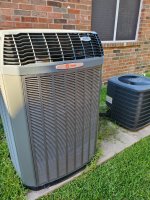I have an opinion about geothermal HVAC systems that may not be popular, but it is based on owning 2 homes over the years with geothermal heating and cooling. My experiences are both with open-loop geothermal, so maybe folks with a closed loop system have had different experiences...
I don't see myself having a 3rd home with geothermal HVAC. Although it is absolutely true that geothermal is, by far, the most economical way to heat or cool a house from an operations perspective, there are downsides to geothermal that folks generally never mention.
1) The up-front cost is very high. Even with Federal and State tax incentives, geothermal is still expensive. Best case is that the tax incentives bring the installed cost into the same realm as a conventional heating/cooling system. And remember, these are TAX incentives -- typically, you still have to pony up the cash upfront and then get it back later through reduced Federal and State income taxes.
2) While this is true for all kinds of HVAC, you really REALLY need to make sure that the company you are using understands how to install geothermal properly. These are very sophisticated systems and a mistake in installation can cause you a lot of pain and suffering, and they can take a long time to identify and correct.
3) Geothermal systems require far less maintenance than traditional HVAC systems, but they do require some maintenance and occasionally repair. Not every HVAC company is well-versed in the ins-and-outs of geothermal. This reduces your options in the event that you have a falling out with the installing company, or in the event that company goes out of business, or if you need an emergency service in the middle of the winter. It does force the homeowner into being something of an expert in geothermal systems so that you can make an emergency repair on your own, or do some regular maintenance to save a few bucks.
4) Any very high efficiency equipment is going to be sophisticated. This almost always means that cost of replacement parts may shock you. As an example, I have a Florida Heat Pump split unit. The fan motor failed in the air handler. The cost of the new fan motor was $1600. I thought I was being lied to, so I called a number of other HVAC outfits. Two of them did not work on geothermal units (see my point above), but they told me that I was being robbed because a new fan motor was about $800 installed. A third outfit that did work on geothermal regularly told me that since Bosch had bought Florida Heat Pump, the prices on parts had gone up some and that the variable speed fan motor in my air handler was indeed a $1600 part. That $1800 repair ($1600 parts, $200 labor) ate up a LOT of the energy savings that the geothermal unit had brought me over the years.
5) This applies to open-loop geothermal, and likely isn't an issue for closed loop systems. The first home I owned with geothermal HVAC used a single well for supply, return and domestic water. It took the better part of a full winter to identify the proper height at which to hang the pump such that I would not suffer thermal mixing or freezing of the return water. This was a painful experience. My current home has a dedicated return well. This has eliminated that issue, but there are others. Water quality becomes a huge concern with open-loop geothermal. When my current supply well suddenly began producing large amounts of particulate matter at year 5 of geothermal use, I found myself struggling to find a proper filtration solution that wouldn't have me cleaning the filter daily. One must also have a properly sized and installed water pumping solution. I ultimately went with a constant pressure pump and a small pressure tank to limit the number of starts and stops that the pump would otherwise encounter when supplying a geothermal heat pump.
Anyway, these are just a few of the less-positive aspects of geothermal heat pump ownership. There is a lot to be said for a conventional HVAC system...

